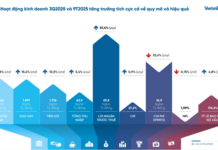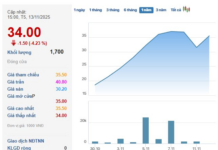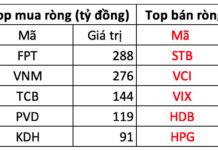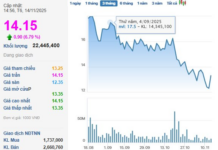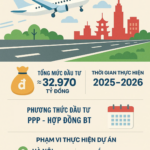
Deputy Minister of Finance Nguyen Duc Tam. Photo: VGP/Minh Ngọc.
Entrepreneurial Confidence Surges
Deputy Minister, Resolution No. 68 by the Politburo is seen as a turning point in development thinking. After nearly half a year of implementation, how do you assess its impact on the business community?
Deputy Minister Nguyen Duc Tam: Resolution No. 68 sets an ambitious goal for the private sector’s rise. By 2030, Vietnam aims for 2 million active businesses, 20 per 1,000 citizens. At least 20 large enterprises will join global value chains. Private sector growth is targeted at 10-12% annually, contributing 55-58% to GDP and employing 84-85% of the workforce. By 2045, the goal is 3 million businesses, contributing over 60% to GDP, with global competitiveness.
To achieve this, the Resolution focuses on improving the business environment, simplifying administrative procedures, reducing compliance costs, and supporting private sector growth, significantly contributing to GDP and the economy.
Resolution No. 68 has injected new vitality, boosting entrepreneurship and business confidence. Since May 2025, over 18,500 new businesses register monthly, a 43% increase from early 2025.
In 2025’s first 10 months, 255,800 new and reactivated businesses were registered, up 26.5% from 2024, outpacing market exits by 34%. Private sector investment reached nearly 5.2 trillion VND, up 98.2%. By October 31, 2025, over 1 million businesses were active.
From May to September 2025, over 12,000 businesses reactivated monthly, with nearly 93,000 reactivations in 10 months, up 40% from 2024. Post-Resolution No. 68, monthly new and reactivated businesses averaged nearly 32,000, up 28.4% from early 2025.
The business environment has significantly improved, as confirmed by the business community. Over 46% of businesses are “optimistic/very optimistic” about Resolution No. 68, the highest in business confidence surveys.
To reach 2 million businesses by 2030, the Ministry of Finance is enhancing institutions and creating a favorable, transparent, and equitable business environment.
Barriers and compliance costs are being reduced through administrative procedure cuts and business condition reforms. By October 2025, the Prime Minister approved cutting 348 procedures, simplifying 1,703, and reducing 2,041 business conditions across 14 ministries. Ministries have initiated or submitted regulations to cut 172 procedures, simplify 718, and reduce 222 conditions.
The approved cuts and simplifications total 2,941 procedures (60.2%) and 2,263 business conditions (31%), saving 13,182 days and over 34.2 trillion VND annually (nearly 29%).

Overcoming Household Business Hesitance
Household businesses are key to reaching 2 million enterprises by 2030. What’s the key to encouraging their transition?
Deputy Minister Nguyen Duc Tam: With 5.2 million household businesses, even a small portion transitioning can achieve the 2 million goal. However, many hesitate due to three main reasons: large compliance cost gaps, unfamiliarity with business regulations, and simpler tax and accounting systems for households.
Resolution No. 68 aims to phase out presumptive taxation by 2026, promoting transparency and incentivizing transitions. As enterprises, they’ll access credit, land, training, technology, and tax benefits under Resolution No. 198.
The Ministry of Finance has drafted a decree for Resolution No. 198, expected to positively impact transitions with free accounting software, short-term training, online registration support, and shorter transition times.

The Ministry of Finance is accelerating digital transformation in taxation, customs, and treasury, aiming for 100% Level 4 online public services.
What specific steps has the Ministry taken to support household businesses in transitioning?
Deputy Minister Nguyen Duc Tam: The Ministry focuses on legal frameworks and practical support. It’s amending tax laws for simpler, transparent compliance, drafting an individual business law to minimize gaps with enterprises, and submitting a decree for Resolution No. 198 with free software, training, and online registration.
To implement presumptive taxation abolition from 2026, the Ministry is upgrading infrastructure, promoting e-invoicing, and providing free e-tax systems and software, especially for struggling households. It’s also enhancing internal digital transformation and data connectivity.
The Ministry has intensified awareness and capacity-building, guiding households in e-invoicing, tax declaration, and accounting software use. It’s also reforming inspections for risk-based, transparent, and business-friendly oversight.

Since May 2025, over 18,500 new businesses register monthly, up 43% from early 2025.
Enhancing Resource Access for Business Growth
Resource access is a major challenge for private enterprises, especially SMEs and innovative startups. What solutions does the Ministry offer?
Deputy Minister Nguyen Duc Tam: The Ministry focuses on tax reforms, efficient SME development funds, land access, and digital transformation support. Tax incentives include R&D investment deductions, fee exemptions for tech startups, and quick VAT refunds for innovative projects.
For land access, the Ministry collaborates to lease surplus public assets transparently and implements Resolution No. 198 for industrial zone land access. It also supports digital transformation, management training, and policy utilization through business associations.
Strategic Priorities Ahead
What are the key priorities to achieve Resolution No. 68’s goals?
Deputy Minister Nguyen Duc Tam: Three key areas: institutional improvement, administrative simplification, and fostering entrepreneurship. The Ministry aims to enhance policies, reduce procedures, and promote digital transformation for a transparent business environment.
It focuses on removing market barriers, improving investment conditions, and building trust through supportive policies and timely issue resolution, driving private sector growth and national competitiveness.
Thank you for your insights. With the Ministry’s efforts, Vietnam’s private sector is poised for significant growth, becoming a key economic driver.
Unlock Surplus Public Land and Assets for Business Lease: Ministry of Finance Initiative
The Ministry of Finance has announced plans to collaborate with relevant ministries, sectors, and local authorities to review and facilitate the leasing of surplus public assets, including land, factories, and infrastructure, to businesses. This initiative aims to optimize the utilization of underused public properties, providing enterprises with valuable resources to expand their operations.
Empowering Private Sector Growth: Prioritizing Legal Support Resources for Breakthrough Success
Unlocking the full potential of the private sector requires prioritizing legal support to ensure a robust framework. This includes establishing a solid legal foundation that enables efficient access to critical resources such as capital, land, advanced technology, and high-quality human resources. Achieving this balance demands legislative reforms that not only meet state regulatory requirements but also foster an environment where businesses can thrive and grow.
Prime Minister: Eliminate Red Tape, Reduce Administrative Burdens on Businesses in Compliance and Standardization Efforts
On the afternoon of October 18th, Prime Minister Pham Minh Chinh chaired a meeting of the Government’s Standing Committee with associations and businesses to address challenges and obstacles in product standardization and compliance.
Business Tax Management from 2026: Ending Presumptive Tax, Fully Transitioning to Declaration Method
As of January 1, 2026, the lump-sum tax method will be discontinued, and the Ministry of Finance will introduce a new management model. Under this model, businesses will be categorized into three groups based on their revenue scale, with corresponding tax regulations and declaration requirements applied accordingly.






